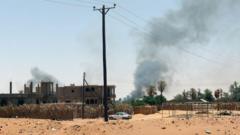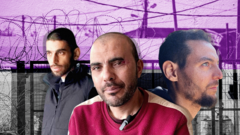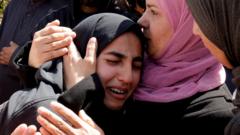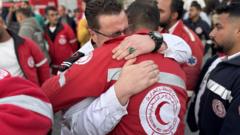At least 28 migrant bodies have been recovered from a mass grave in Libya, discovered amid continuing trafficking investigations that highlight the ongoing crises and dangers faced by migrants in the region.
**Mass Grave of Migrants Discovered in Libya Following Trafficking Raid**

**Mass Grave of Migrants Discovered in Libya Following Trafficking Raid**
Authorities uncover chilling evidence of migrant abuse in ongoing struggle against human trafficking in Libya.
The bodies of at least 28 migrants have been unearthed from a mass grave situated in the desert region of southeastern Libya, as announced by the country's attorney general. This discovery took place near Kufra, shortly after officials located an earlier grave containing 19 bodies on a farm in the same vicinity. The latest mass grave was uncovered following a police operation at a human trafficking location, where 76 migrants were freed from detention, enduring torture.
According to the attorney general's office, one Libyan national and two foreign individuals have been arrested in connection to these crimes. The department emphasized that a gang was responsible for the deliberate deprivation of freedom from illegal migrants, subjecting them to inhumane treatment including torture.
Visuals circulated online depict rescue workers and volunteers clearing the sand to recover the deceased, who were subsequently placed in black bags. The search operation continues in Kufra, located over 1,700 kilometers away from the capital, Tripoli. The attorney general detailed that autopsies are being performed on the recovered bodies amid suspicions that these instances are tied to ongoing smuggling networks in the region. Local authorities are collecting testimony from survivors to aid the investigation.
Last year, a mass grave revealing at least 65 migrant bodies was discovered in southwestern Libya, prompting the International Organization for Migration (IOM) to label the situation as "deeply shocking." Since the fall of Muammar Gaddafi in 2011, Libya has increasingly become a major transit hub for migrants attempting to navigate perilous desert and sea routes while seeking refuge and a better future in Europe. Reports have indicated that in the year 2024 alone, over 2,200 people have either died or gone missing while attempting to cross the Mediterranean.
This alarming trend is compounded by disturbing reports of violence and abuse faced by migrants, particularly vulnerable populations like women, who often suffer from sexual violence and exploitation as they traverse through Libya, which has been described as "a living hell" for many.
According to the attorney general's office, one Libyan national and two foreign individuals have been arrested in connection to these crimes. The department emphasized that a gang was responsible for the deliberate deprivation of freedom from illegal migrants, subjecting them to inhumane treatment including torture.
Visuals circulated online depict rescue workers and volunteers clearing the sand to recover the deceased, who were subsequently placed in black bags. The search operation continues in Kufra, located over 1,700 kilometers away from the capital, Tripoli. The attorney general detailed that autopsies are being performed on the recovered bodies amid suspicions that these instances are tied to ongoing smuggling networks in the region. Local authorities are collecting testimony from survivors to aid the investigation.
Last year, a mass grave revealing at least 65 migrant bodies was discovered in southwestern Libya, prompting the International Organization for Migration (IOM) to label the situation as "deeply shocking." Since the fall of Muammar Gaddafi in 2011, Libya has increasingly become a major transit hub for migrants attempting to navigate perilous desert and sea routes while seeking refuge and a better future in Europe. Reports have indicated that in the year 2024 alone, over 2,200 people have either died or gone missing while attempting to cross the Mediterranean.
This alarming trend is compounded by disturbing reports of violence and abuse faced by migrants, particularly vulnerable populations like women, who often suffer from sexual violence and exploitation as they traverse through Libya, which has been described as "a living hell" for many.



















